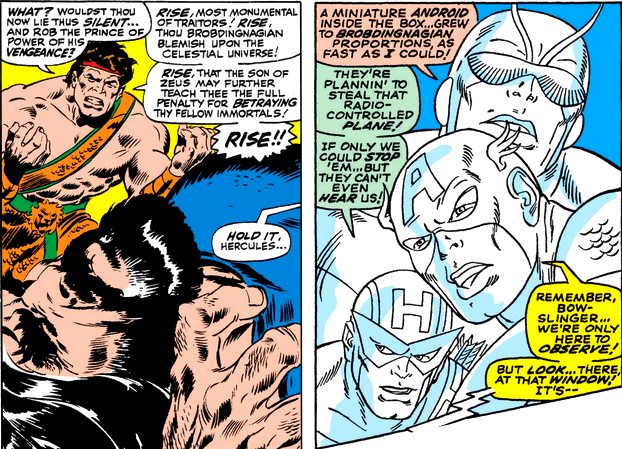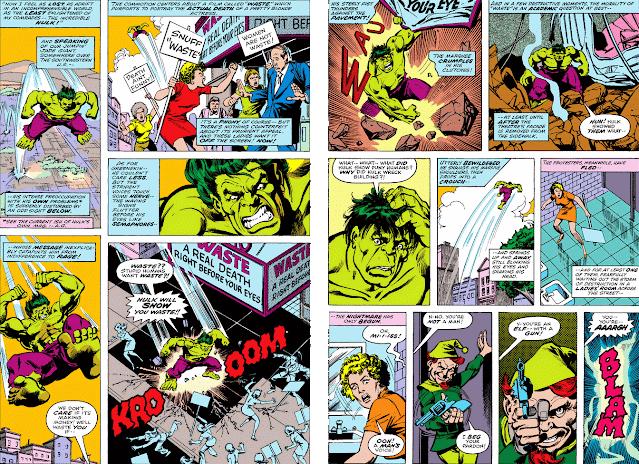Given how prevalent the plotline of anti-mutant sentiment has been in Marvel's line of X-books, and how we've seen increasingly powerful forces engage in operations to target and incapacitate or eliminate mutants, it was no surprise to find even the mutant X-Men questioning Charles Xavier's dream of peaceful co-existence between humans and mutants--at one point, even holding an impassioned meeting with their founder and mentor which called into question their taking on field missions which often only served to put targets on their backs. Such a meeting could only bring to light the injuries and deaths the team has suffered and grieved; and to his dismay and sadness, Xavier also discovers from Rachel Summers, who has arrived from an alternate timeline where mutants have been openly hunted and enslaved, that he and his school and students were early casualties in the outbreak of full-scale war against mutants.
As we've learned from Nightcrawler, and as we've seen for ourselves, there were serious consequences for Storm during the operation against Rogue which was sanctioned by the United States government. Yet in the beginning, before the "X-Men" were formed and Xavier began to see humans becoming aware of and alarmed at the existence of mutants in their midst, he reached out to the office of the F.B.I. charged with investigating the situation and proposed working closely with its agents as a joint task force, comparing notes on the mutant situation as it developed while also making contact with any mutants who appeared in order to ascertain and, if necessary, curtail any threat they might pose.
Thus would begin a long and productive quid pro quo relationship between Xavier and the office of Special Agent Fred Duncan, as Xavier assembled a staff of his own to respond to incidences where it was necessary to learn the abilities and intentions of a new mutant.* Strange that Duncan and Xavier didn't choose to make contact with each other when Magneto had attacked Cape Citadel; instead, Xavier was alerted to the incident by, of all things, a radio bulletin. But the two men were on the same page when it came to the Vanisher.
*Xavier would be more direct with the X-Men themselves as to their ongoing mission: "There are many mutants walking the Earth... and more are born each year! It is our job to protect mankind from those mutants who hate the human race, and wish to destroy it... the evil mutants!" (paraphrased from The X-Men #1)
Duncan's communications with Xavier (and vice versa) take place behind the scenes from this point on (alerting Xavier to the sightings of Ka-Zar, for instance). But when Xavier suddenly dies after a fatal encounter with the "sub-human" named Grotesk, Duncan addresses the X-Men after the funeral regarding their future. (Writer Gary Friedrich has him named "Amos" Duncan, for whatever reason.)
Time passes, and Duncan would appear here and there in other titles such as Ka-Zar, Shanna the She-Devil--as well as X-Men: The Hidden Years, a title which picks up where the cancelled X-Men series left off and of course features a once-more-alive Xavier who had recovered by the end of the original series' last issue. Here, he mostly makes a cameo appearance, but it's a nice nod to the character by writer/artist John Byrne.
Much later, however, when the new X-Men have established themselves, Senator Robert Kelly, who heads an ad hoc Congressional committee on mutant affairs, begins stoking anti-mutant fervor once more--and the team's below-the-radar ties with the U.S. Government now work against them.
The X-Men's plan succeeds (though not without complications)--and if you're wondering why Duncan himself didn't head this off, stay tuned.
An interesting companion piece to the relationship between Xavier and Duncan can be found in the 2008 issue X-Men: Odd Men Out, which publishes two previously unreleased stories by former X-Men artist Dave Cockrum two years after his death and adds context to pivotal points in the existence of the team which Duncan and of course Xavier played a role in. The first story, written by Roger Stern, reunites the two old friends after Duncan had retired from the Bureau and began working as a security consultant while also writing a book (hoping to "blow the lid off the government's mishandling of anti-mutant hysteria."
The issue is a pleasant trip down memory lane for the two, as well as an interesting retrospective--while Stern, no stranger to past lore of Marvel's stable of heroes, provides sensible explanations for those instances where Duncan's activities "behind the scenes" could have shed some light on things occurring in the book during the late '60s. For example, Duncan's true reason for instructing the team to split up following Xavier's "death" (a sham which both Duncan and Jean Grey had been made fully aware of by Xavier):
While "Project Wideawake," which involved the Government constructing and deploying a new series of Sentinels as part of an effort to seek out and end the mutant threat, barrels ahead while shutting out Duncan's input entirely.
As for the virus that Carol Danvers deploys to erase the Pentagon database on the X-Men, Duncan is there when Project Wideawake's head, Henry Gyrich, comes looking to roll some heads but is outraged by Duncan's seeming inability to reconstruct the data. And when Gyrich pulls rank, he finds that Duncan has already prepared his response.
In a later series published in 2012-13, The First X-Men by Neal Adams and Christos Gage, where Logan and Sabretooth take it upon themselves to gather a group of young people (not yet denoted as "mutants" by nongovernment personnel) and train them in the use of their powers, Duncan is presented as a counter to the plans of Bolivar Trask, who offers a different, aggressive approach to dealing with those powered individuals who have begun appearing in news accounts. The shocked expressions of both men (the exception being Mr. Hartfield's casual introduction) indicate the arrival of the hideous entrance of Lyle Doorne, aka Virus, whose mobility depends on grafting onto and gradually draining the life of a human host--a mutant who assures them that it can neutralize the threat presented by Logan and Creed and add them to the government's ranks in "controlled" form.
As for Duncan, he continues his own efforts in these early days of his career... encountering Logan and his group as they attempt to recruit the (at this point in time) vagrant Sub-Mariner... butting heads with Trask... and unknowingly crossing paths with Xavier when he was a private in the army while the government had yet to make their investigations into the growing population of mutants public.
Regrettably, Logan's efforts implode, and, demoralized, he washes his hands of the entire debacle and goes his own way--but not before Duncan takes a last stab at bringing him into the fold in a more formal capacity.
While each of these later series in their own way brings us full circle, Adams' series of course finds a way to blend in new material which serves to start the ball rolling on what would become a distinguished career of public service for Duncan. It's gratifying to see such attention paid to what essentially amounted to a footnote in the history of the X-Men, and fortunately these stories were told at a time before Marvel began to so radically reinvent its print product. As for Agent Duncan making it to the big screen, the closest we come to Duncan appearing in film was with the character's uncredited portrayal by actor Oliver Platt in "X-Men: First Class"--a C.I.A. man in his new role, but an adjustment that we know Fred Duncan would have taken in stride.

























































